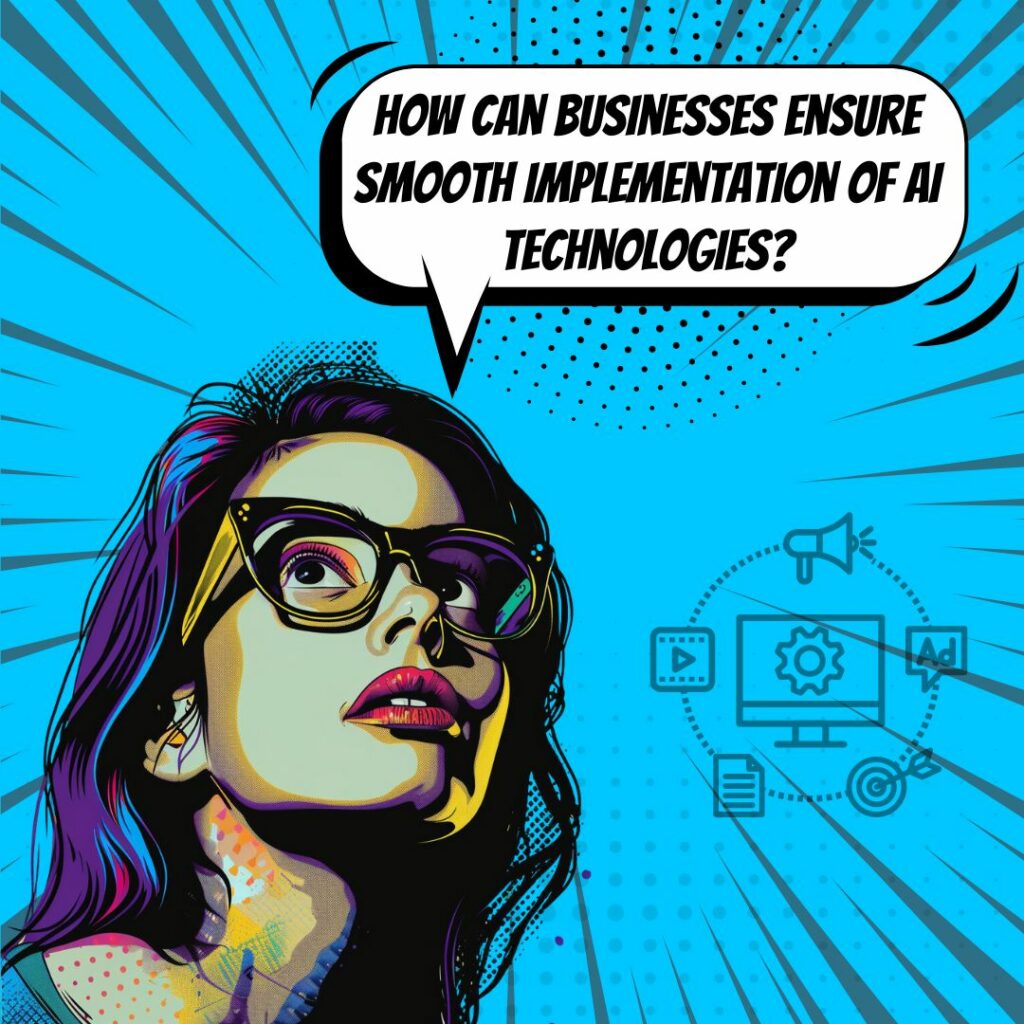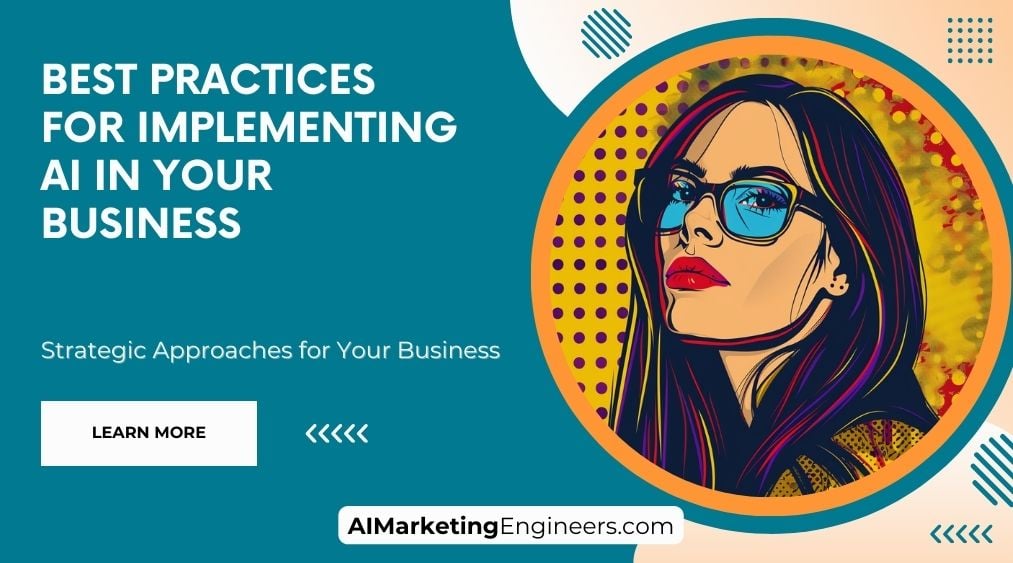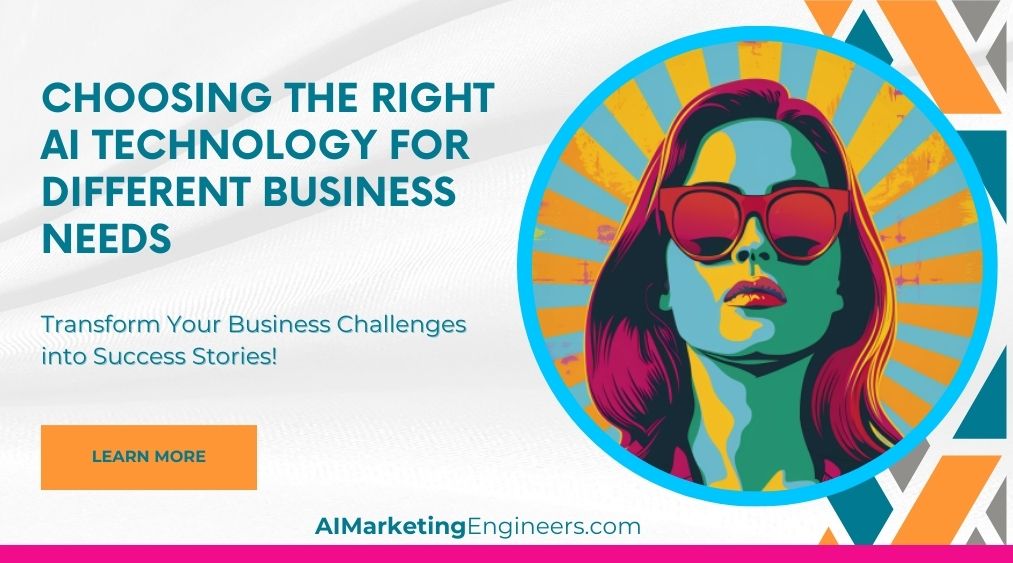Key Takeaways
✅ Strategic Planning and Alignment: Imagine AI as a puzzle piece – it's got to fit just right into your big business picture. If it doesn't mesh with your goals, well, it's just a cool toy, not a business tool. So, how do you make it click? Begin with a plan that spots where AI would shine in your operations. Got that? Good.
✅ Data Management and Quality: You know what AI feasts on, right? Data. Delicious, high-quality data. But serving up a dish of bad data? That could ruin the whole meal. Focus on cleaning up your data, making sure it's as neat as a new pin. Trust me, it'll make a world of a difference.
✅ Talent Development and Collaboration: Even the fanciest AI tech won't dance without the right people leading it. It's all about harmony – blending the know-how of tech maestros with the vision of your business gurus. Think of it like a band tuning up to play an epic symphony together!

Introduction
Have you ever stopped to ponder: What can AI really do for my business? Could it be the genie in the bottle, or is it just a flash in the pan? Well, AI in Business isn't just a passing fad; it's a game-changer that's reshaping the playground. It's turning the mundane into the marvelous, transforming data into decisions, and guess what – it's ready to work its magic for you.
Curious about the spells you can cast with AI? We've got stories of businesses that have ridden the AI wave to new heights, and we're itching to share them with you. Tailored tools, a team sharper than Sherlock himself, and a roadmap so clear you'd think it was drawn by a laser – it's all on the agenda. And let me drop a little teaser – we've got secrets up our sleeve that could turbocharge your revenue, ROI, and ROAS. We're not just talking fluff here; we're talking genuine, tried-and-tested golden nuggets of wisdom that can see your business soar.
So, buckle up, my friend. We're not just going to peel back the curtain; we're going to throw it right open. Get ready for some bold, groundbreaking info that promises to tickle your curiosity and spark a revolution in your very own business empire.
Top Statistics
| Statistic | Insight |
|---|---|
| Global AI Market Growth: Expected to increase from $387.45 billion in 2021 to $1,394.30 billion by 2029. (Source: Fortune Business Insights, 2021) | This explosive growth indicates a massive shift towards AI, emphasizing the need for businesses to adopt this technology to stay relevant. |
| AI for Competitive Advantage: 84% of businesses see AI as a key to competitive advantage. (Source: Deloitte, 2020) | It's clear that the majority of businesses are confident in the power of AI to transform their operations and set them apart from the competition. |
| AI in Customer Experience: 40% of businesses have implemented AI to enhance customer experiences. (Source: Salesforce, 2021) | Improving customer experience is not just a trend, it's a strategic move. Businesses leveraging AI here are likely to see higher satisfaction and retention rates. |
| AI in Healthcare: AI adoption in healthcare predicted to grow at a CAGR of 40.8% from 2021 to 2028. (Source: Grand View Research, 2021) | The remarkable adoption rate in healthcare suggests AI's potential to revolutionize this vital industry, from patient care to administrative tasks. |
| AI Investment in Retail: Retail sector's expected AI investment is $12 billion by 2023. (Source: BusinessWire, 2019) | This investment will drive innovation in how we shop, indicating a potential for significant transformations in the retail customer experience. |
Understanding AI's Role in Business
Have you ever wondered how AI could boost your business? Well, imagine having a crystal ball that helps you make better decisions or having an extra team that works around the clock. That's AI for you – a powerhouse of insights and automation. Companies are making strides using AI, ranging from predicting customer behavior to optimizing supply chains. Picture Amazon's recommendation engine or how Netflix figures out your next binge-watch – that's AI at work!
Pinpoint Your Goals and Tackling The Rough Spots
Alright, so where do you start? It's simple: identify what you want to achieve. Do you need to speed up your customer service? Or maybe cut down production waste? Whatever it is, getting clear on your objectives and challenges is key. This means rolling up your sleeves and diving into your current operations. Look under the hood of your data. Is it clean, structured, and ready for AI, or is there a bit of a mess to tidy up first?
Building Your AI Dream Team
Bringing AI into your business is no solo mission. You need an AI Dream Team. Think of them as your tech Avengers. You might need data scientists who can unearth golden nuggets of information, or engineers who can build the tools to use it. And don't forget, your team should play well with others because this is definitely a group effort.
Picking the Tools That Fit Like a Glove
Selecting the right AI tools and technology is crucial. It's like choosing the perfect pair of shoes; they need to fit just right. So, consider what your business actually needs. Can the tool grow as you grow? Will it play nicely with the software you already use? And, how tight is it going to keep the lid on your precious data?
Laying Down the Data Law
Now, for the backbone of AI – your data. Having a solid data strategy means making sure your data is clean, properly stored, and accessible where and when you need it. It's also about safeguarding it. You wouldn’t leave your car unlocked, so why risk your data?
Taking Baby Steps with AI
Let's talk about making the leap with AI. Here’s a word to the wise: start small. Pick a low-risk project as your testing ground. Succeed there, and you'll gain the confidence to slowly ramp it up. The goal is to get better and smarter with every step without taking a nosedive on your first try.
Keeping Score and Making Tweaks
Now, it isn't enough to just launch AI and hope for the best. You need to track your progress with key performance indicators (KPIs). Imagine these as your fitness tracker but for your business goals. They tell you if you need to pick up the pace or if you’re sprinting ahead. And just like a personal best, you’ll want to keep beating your AI achievements by continuously improving.
Alright, are you feeling geared up to embrace AI in your business? Remember, it's a journey of exploration and growth. Stay curious, stay collaborative, and always stay open to change. And before you know it, you might just find your business transformed by the power of AI.
AI Marketing Engineers Recommendation
Recommendation 1: Start with a solid data foundation: Before AI can transform your business, you need to ensure you're collecting high-quality data. This means your data should be accurate, comprehensive, and clean. Remember, AI is only as good as the data it's fed. Get to know which data points are critical for your AI tools to produce reliable insights and automate processes effectively. Are you keeping an eye on the right metrics? Do you regularly audit your data for errors? This is vital, since even the fanciest AI can't make sense of a mess.
Recommendation 2: Don't get swept up in the AI hype—focus on real-world solutions: It's easy to get caught up in the latest tech craze, but what does your business actually need? Look at the problems you're trying to solve or the processes you want to enhance. Is it customer service? Perhaps an AI-powered chatbot could streamline inquiries. Looking to personalize marketing? AI can tailor recommendations to individual customers. Find the fit for AI that can make a real difference for your business. And how are your competitors using AI? Keep an eye on them, but always circle back to what will provide real value for you and your customers.
Recommendation 3: Train your team to work alongside AI: AI isn't a replacement for human intelligence; it's a collaborator that enhances it. How comfortable is your team with AI? Do they understand its capabilities and limitations? Investing in training can empower your employees to use AI tools effectively, making your business smarter rather than just more automated. Have you thought about how AI could change roles or create new opportunities within your business? It's about merging human creativity with AI efficiency for a winning combo!
Relevant Links
Supercharge Your Strategy: How AI Powers Up Your Business
AI-Enhanced Decisions: Crystal Ball of the Modern Age
AI and Marketing: A Match Made in Data Heaven
ChatGPT – Your Secret Weapon for Content Masterpieces
Revolutionize Your Ads with AI Superpowers
Crafting Brand Excellence with AI
AI's Ethical Side: Tackling Moral Dilemmas in Marketing
Avoid Pitfalls: Ethical AI Marketing Insights
AI Analytics: The Game-Changer for Market Insight
Unravel Market Mysteries with AI Analytics
Conclusion
So, let's take a moment to think about our journey with AI. We started off curious, perhaps a little unsure of what this all meant for our business. But now, after diving into the best practices for implementing AI in your business, we've armed ourselves with knowledge that can help turn the tide in our favor.
We've talked about identifying the real problems we want to solve and the goals we aim to achieve with AI. Doesn't it make sense to look before we leap? We recognized the importance of bringing on board folks who really know their stuff about AI. They're like the navigators in uncharted waters. And when it comes to tools and tech, we've figured out that one size doesn't fit all; we have to find the right fit for our unique business needs.
The thing about AI that often gets lost in all the tech talk is the data strategy. Good, clean data is like gold, isn't it? It's what makes AI tick. And we've learned the brilliance of starting small with AI projects, making sure they work, and then expanding them. It's like learning to walk before we can run. Now, how are we going to know if we're doing it right? By keeping track of how things are going and being ready to switch gears if needed. Measure the impact, learn from the move, and keep on tweaking and improving. It's all about that continuous improvement, staying flexible.
This is more than just a set of instructions; it's about seeing the significant impact AI can have on our business when done right. Our journey with AI is ongoing—there's always something new on the horizon. Have you wondered what your first step will be? How will you adapt and grow? Remember, embracing AI is not just about jumping on a bandwagon; it's about driving your business forward with intelligence. So, let's roll up our sleeves and get ready for this adventure. Together, we'll keep learning, keep collaborating, and keep pushing the boundaries of what's possible.
FAQs
Question 1: What is AI, and how can it benefit my business?
Answer: AI, or Artificial Intelligence, is like teaching computers to think and act like humans. The cool part? It can make your business smarter by doing the grunt work, treating your customers like VIPs, and helping you make decisions that are backed by solid data.
Question 2: What are the key components of an AI system?
Answer: Imagine an AI system as a high-tech recipe. The main ingredients? Some complex recipes (machine learning algorithms), a kitchen that organizes your ingredients (data processing pipelines), a translator to interpret your cookbook (natural language processing), and a crystal ball to predict how your dish will turn out (predictive analytics).
Question 3: How do I choose the right AI technology for my business?
Answer: Choosing the right AI tech is like picking the perfect outfit. First, know what's the occasion (your business problem), then check what's in your closet (AI solutions and your tech setup), and finally, ask if it's worth the tag (potential ROI).
Question 4: What are the best practices for data collection and management in AI?
Answer: Collecting data for AI is like gardening. You need good seeds (data quality), some privacy hedges (privacy and security), and a neat layout for your plants (data governance policies). All that, plus the right pots and soil (storage and processing tech).
Question 5: How can I ensure the ethical use of AI in my business?
Answer: Keeping AI ethical is all about setting ground rules (clear guidelines), being honest about what you’re doing with the information (transparency), and constantly checking your AI's mirror for any accidental face-paint smudges (biases and unintended outcomes).
Question 6: What are some common challenges in implementing AI, and how can I overcome them?
Answer: With AI, you might hit a few bumps like finding a needle in the data haystack, needing more brainpower, people dragging their feet, or watching your wallet. Tackle these by investing in better data, training or hiring smart people, chatting about AI perks, and being smart with your funds.
Question 7: How can I integrate AI into my existing business processes?
Answer: Plug AI into your biz like adding an upgrade to your favorite app. Pick what needs a boost, get your team on board, and start small with tools that make what you do even better.
Question 8: What are some advanced AI techniques that I can use to gain a competitive advantage?
Answer: Want to be an AI ninja? Get into the dojo of deep learning, reinforcement learning, and GANs (fancy tech for having AIs outsmart each other). These can make your predictions sharper, your workflow slicker, and help you cook up some fresh ideas.
Question 9: How can I measure the success of my AI initiatives?
Answer: Is your AI hitting the mark? Keep tabs by setting goals, tracking your progress like a hawk, and using what you learn to make everything run smoother.
Question 10: What resources and communities can I join to stay informed about the latest AI developments and best practices?
Answer: Keep your AI knowledge fresh by hanging out with other AI geeks, popping into talks and workshops, stalking AI gurus online, and nibbling on updates from newsletters and articles.
Academic References
- Davenport, T. H., & Ronanki, R. (2018). Achieving Strategic Agility with AI: A Framework for Business Value. California Management Review. This article presents a structured approach for businesses to harness the power of AI by focusing on strategic agility and aligning AI initiatives with business objectives for maximal impact.
- Ransbotham, S., Kiron, D., Gerbert, P., Reeves, M., & Spira, M. (2018). Artificial Intelligence and Business Strategy. MIT Sloan Management Review. The authors delve into the strategic aspects of AI for businesses, advocating for a deep understanding of the technology and the development of a robust AI strategy to remain at the forefront of competition.
- Davenport, T. H., & Ronanki, R. (2019). The AI Advantage: How to Put the Artificial Intelligence Revolution to Work. MIT Press. This book serves as an extensive guide on AI implementation in business settings, putting forth the view that the human-centric approach should be balanced with AI's capabilities to enhance overall productivity.
- Sajib, S. M., Hossain, M. S., & Hossain, M. A. (2020). AI Adoption in Organizations: A Systematic Literature Review. Journal of Business Research. A meticulous review of literature focusing on the adoption of AI within organizations, the study brings to light various factors like organizational culture, leadership styles, and employees' skill development that are pivotal for successful AI integration.













